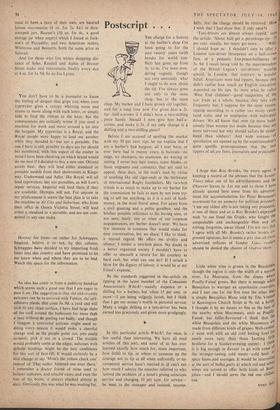Postscript • • •
Before I am accused of spoiling the market with my 50 per cent. tips, let me explain that I am a barber's bad bargain; all I ever have, or ever have had in twenty years, is haircuts—no singe, no shampoo, no manicure, no waving or tinting. I never buy hair tonics, razor blades, or those unguents and cosmetics that are said to appeal, these days, to the man's man by virtue of smelling like old cigar-ends or the bathwater of international Rugby footballers. My two-bob tribute is as much to make up to my barber for the commission he fails to earn by not even try- ing to sell me anything, as it is a sort of hush- money, in the most literal sense. For apart from a civil greeting and a polite goodbye, and the briefest possible reference to his having seen, or not seen, lately, one or other of our common acquaintances, my barber doesn't utter. We have few interests in common that would make for easy conversation, but we share, I like to think, a mutual regard. He offers me civility and silence; I tender a two-bob piece. No doubt in a better organised society I shouldn't have to offer so uncouth , a return for his courtesy as hard cash, but what can one do? If I struck a blow for the dignity of labour, it would be at my friend's expense.
By the standards suggested in thea article oh tipping in the latest number of the Consumer Association's Which?—usually sixpence or a shilling for a barber, but `often 15 per cent. or more'-1 am being vulgarly lavish, but I think that I get my money's worth in personal service. Many a single shilling to a taxi-driver has been earned less graciously and given more grudgingly.
In this particular article Which?, for once, is less useful than interesting. We have all read articles of this sort, and none of us has ever learned exactly how much (or, more important, how little) to tip, or where to summon up the courage not to tip at all when unfriendly or in- competent service hasn't merited it. (I can't say how much I admire the member referred to who `solved the problem of a hotel's giving atrocious service and charging 10 per cent. for service— he went to the manager and insisted, success- fully, that the charge should be removed.' HoW I wish that I bad done that, if only once!) 'Taxi-drivers are almost always tipped,' saYs the article. 'About half get a percentage tip—ICI per cent. usually, but many get more. .' Well I should hope so: I shouldn't care to offer a London taxi-driver threepence on a half-crown fare, or a pedantic fourpence-halfpenny ofl 3s. 9d. I recall being told by the superintendent of the British Legion's taxi-drivers' training school, in London, that contrary to popular belief, Americans were bad tippers, because theY didn't realise how much an English tax-i-driver depended on his tips. So were what he called 'West End clubmen'—good supporters of the taxi trade as a whole, because they take cabs frequently but, I suppose for the same reason, tipping according to a rather too nicely calcu. lated scale, and so unpopular with individual drivers. We all know that men tip more hand- somely than women (no doubt because they are more nervous) but why should sailors be close- fisted than soldiers'? And wide avenues of speculation are opened up by the superintendent's quite specific pronouncement that the best tippers of all are Jews, journalists and prostitutes.
I hope that Roy Brooks, the estate agent, IS keeping a record -of the phrases that the S'undaY Times takes out of his advertisements and the Observer leaves in. Let me add to those I have already quoted here some from his advertise' ment for accommodation for Peter Benenson s movement for an amnesty for political prisoners' see our oldest ally is mot taking any prisoners'- is one of them and so is Roy Brooks's expressed wish 'to see freed the Greeks who fought the unspeakable and unchangeable Hun and are rotting, forgotten, Oman island.' Fm not sure th3t I agree with all Mr. Brooks's rather briskly el' pressed opinions, but it seems a pity that all tho`e advertised millions of Sunday Time., reader' should be denied the chance of read■ne them Little white wine is grown in the Beaujolais, though the region is only the width of a narroW river, La Mauvaise, from the slopes where Pouilly-Fuisse' grows. But there is enough MO Beaujolais to warrant an appellation controlee' and I met one for the first time the other daY, a simple Beaujolais Blanc sold by The Vintner in Kensington Church Street at 9s. 6d. a bottle; I thought it by no means so fine as the best 01 the nearby. white Maconnais, such as Pouillr Fuisse, but fulfer-flavoured—I think that 1115 white Beaujolais and the white Maconnais are made from different kinds of grapes. Well-cooled' it went well with an old cold boiling fowl (5,c) much more tasty than those footling lirt1f, broilers) for a Sunday-evening supper: it is big enough in flavour to go with some 01 the stronger-tasting cold meats—cold beef..°C spicy hams and sausages. It would be interesting at the sort of buffet party at which red and wtnte. wines are served to offer both kinds of Bent); jolais--and I should serve the red one chill too.
cram 14


































 Previous page
Previous page